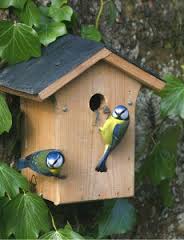Baby Boom

Those of you who feed the birds, and thankfully there are many of us, will have noticed that your feeders are being emptied more quickly and that there are more smaller birds visiting your feeders and bird tables too. This is the time of year that our garden birds have juveniles which are ready to leave the nests; they are able to fly for short distances and are shown where the best food sources are by their parents, which is usually our garden bird tables and feeders. We have noticed some small balls of fluff, identified as baby blue tits waiting patiently near the feeders and watching carefully what mum and dad are showing them.
As these youngsters are easy prey until they get older and wiser, and hopefully they will live to get older there are a few ways in which we can help them without too much trouble to ourselves.
Fresh shallow water is a high priority as many young birds will not be able to fly far from the nest for a drink; the water should be shallow and clean, topped up regularly to avoid diseases and infections which can kill younger birds. Sometimes a shallow dish or baking tray is sufficient until the baby birds are able to fly further.
Dogs and cats can be a problem too for younger birds, older birds are much more wary so these babies become easy prey to even our own house pets. Whilst we can’t keep an eye on our pets all of the time when they are in the garden, it has been suggested that cats could maybe wear a collar with a bell on it to maybe warn the birds off.
Often we see baby birds just sitting on the ground and whilst it is most tempting to put them in a place of safety the best advice is not to interfere unless the bird is in imminent danger, or has maybe knocked itself out by flying into a window. This has happened here on a number of occasions but usually by the time I have gone into the garden the poor bird has recovered and flown away. The reason for this is that the adult birds probably won’t be too far away and will be more distressed by human intervention, and if you do have to handle them , please keep it to a minimum if possible. If you put the bird in a safe position, please make sure that it is as near to where the bird was found as the parents will probably be nearby.
Food is also an issue with fledglings. The general advice is to avoid peanuts as these can choke a younger bird; chopped peanuts are fine, as are bird food, fat balls and mealworms. Some of our customers do not feed peanuts to the birds at all until about September as some birds have more than one hatching and these later broods can be in the nest until late August.
Birdwatching can be most entertaining and we know that lots of you have cameras in your bird boxes and keep us informed of the progress of the hatching and fledgling of your garden favourites. Hopefully the summer will be a bumper year for the birds and ensure you have lots to watch all year round.
https://www.laverockhallfarm.co.uk/wild-bird-food/high-energy-wild-bird-food-12-55kg-detail
When you subscribe to the blog, we will send you an e-mail when there are new updates on the site so you wouldn't miss them.

